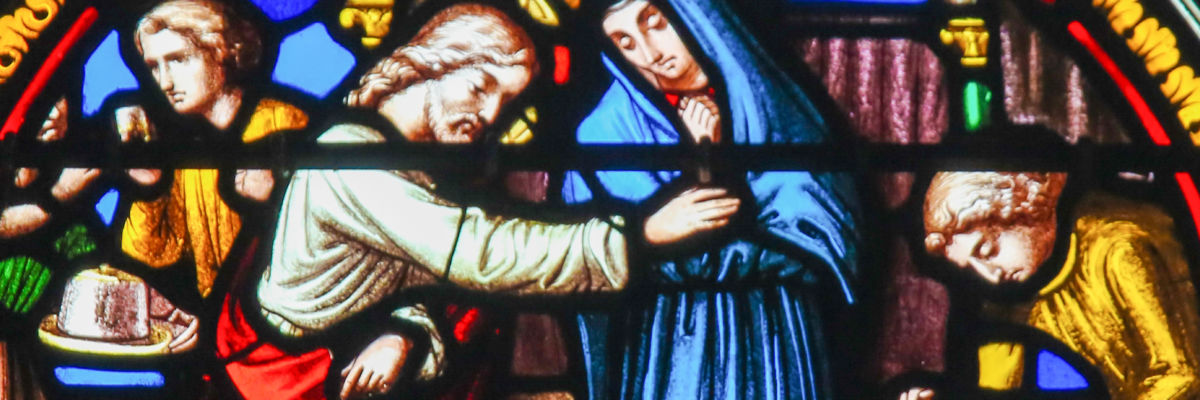
In some passages in the Bible, like Abraham bartering with God over Sodom and Gomorrah (Gen. 18) or Jesus at the wedding at Cana (Jn. 2), God appears to change his mind. But how can this be, when philosophy and Catholic theology are adamant that God is utterly unchanging? Jimmy Akin clears up the confusion.
Transcript:
Host: And we go to Michael in Boston, Massachusetts, watching on catholic.com. Michael, welcome to Catholic Answers Live.
Caller: Hi, thanks Jimmy. So the question that I have comes from there are a few different instances in the Bible where it seems like God or Jesus changes his mind, whereas we know that, you know, God does not do that. So for example, in Genesis 18, Abraham seems to bargain with God; or in John 2, Mary seems to change Jesus’ mind at the wedding at Cana. And I just wanted to kind of see what Jimmy thinks about these passages and others that seems to show that God may be open to changing his mind, which doesn’t go along with our understanding of God’s nature.
Jimmy: Yeah, so we have to distinguish between God’s divine mind and then also the human intellect that Jesus has in the Incarnation.
God’s divine mind is part of the divine nature, and the divine nature is unchanging. It’s outside of time, so in his divine intellect, God does not change. And that means that when we encounter passages like before the flood, where it says God “repented” that he made man and so he’s going to send the flood, that’s a metaphor. He doesn’t literally change his mind.
And in the same way, when God bargains with Abraham, God always knew what the deal would end up being, but scripture nevertheless depicts it as this kind of negotiating process between God and Abraham, which is essentially a form of prayer. And actually, this passage doesn’t require God changing his mind, other than, if nothing happens—this is the element that is a bit metaphorical— if nothing happens, God’s going to just wipe out Sodom and Gomorrah, and Abraham intercedes and says “Well, what if we get this many righteous men? Will you spare it?” And God says “Yes,” and this is conditional, the way a lot of prayers are conditional.
God has willed, outside of time: “If this happens inside of time, like if someone prays to me about this, then I’ll respond this way,” or “If we find this many people who are righteous in this town, then I’ll respond this way.” It’s essentially a conditional willing on God’s part. He wills one thing if this other thing happens. And scripture just presents it to us from a human point of view, as if Abraham is negotiating with God, but really God knows from all eternity what’s going to happen here.
This is accommodated to humanity, to our way of understanding things, because we experience things as processes that play out over time. And that applies to anybody who has humanity, and Jesus, in the Incarnation, has humanity. So his human intellect operates differently than his divine intellect. His divine intellect is changeless, but his human intellect does change over time, and we see this, for example, in the Gospel of Luke, where it talks about how, as a young man, Jesus grew in knowledge and wisdom and favor with God and man. So Luke acknowledges Jesus grew in wisdom—in his human mind.
And if you read the Catechism of the Catholic Church, it talks about how Jesus, as one living in the human condition, had to inquire for himself about those things which one living in the human condition has to ask about. So like, when he is touched by a woman in the crowd at the raising of Jairus, and he perceives that power has gone out from him and healed this woman, he says “Who touched me?” He’s not putting on some kind of theatrical show, he’s asking “Who touched me?” And because that’s the kind of thing that a person who’s living in the human condition would have to ask about, and the Catechism acknowledges that in his human intellect, he had to ask questions like that to find out the answers.
And so his human intellect does change and grow and develop over time, so we need to—it also has certain things, like a knowledge of who he is, that were just directly downloaded from the cloud, if I can put it that way, from his divine nature. So he also has divinely infused knowledge in his human intellect; but he also has this human knowledge that does grow and develop over time, and so we need to be a little more careful in talking about “Well, God doesn’t change.” Things about Jesus’s human nature do grow and change, he grows and develops, but yes, God, in his divine nature, outside of time, does not change, and so passages that would suggest that he does are meant to be metaphorical in one way or another.



